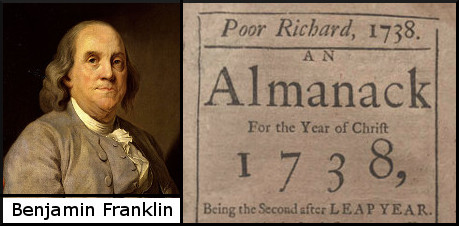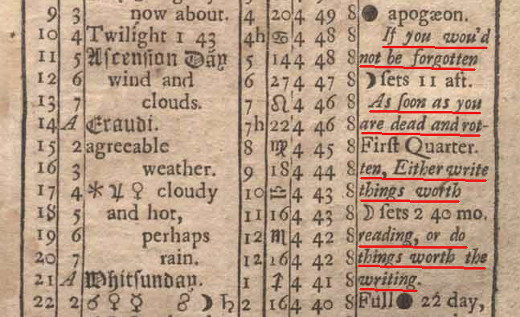Benjamin Franklin? Thomas Fuller? Apocryphal?

Question for Quote Investigator: If you wish to be remembered by posterity in a literate culture you have two options:
1) Write something that people wish to read.
2) Do something grand that inspires people to write.
The famous statesman Benjamin Franklin has a secure place in history for both of these reasons. Apparently, he crafted a remark that was similar to the one above although he was more eloquent. Would you please locate this adage?
Reply from Quote Investigator: Franklin published a series of almanacs in the 1700s that were very popular, and many of the statements that are credited to him today were printed in these almanacs. The pertinent adage appeared in the 1738 edition of “Poor Richard’s Almanac” whose more complete title was “Poor Richard, An Almanack For the Year of Christ 1738, Being the Second after LEAP YEAR.”
The phrases of the expression were interleaved with astronomical facts concerning the month of May 1738. QI has underlined the adage in red in the image below which shows part of Franklin’s book:1
If you wou’d not be forgotten
As soon as you are dead and rotten,
Either write things worth reading,
or do things worth the writing.

Many of the sayings in the almanacs were not coined by Franklin. He read several contemporary compilations and sometimes selected statements he found interesting. He also rewrote existing adages and even combined sayings.
The core of the adage under investigation appeared earlier in a collection titled “Introductio ad Prudentiam: Or, Directions, Counsels, and Cautions, Tending to Prudent Management of Affairs in Common Life” by Thomas Fuller which was published in 1727. Adage number 686 was the following:2
If thou wouldest win Immortality of Name, either do things worth the writing, or write things worth the reading.
Here are additional selected citations in chronological order.
In 1855 a reference work titled “Cyclopaedia of American Literature” included a section about Franklin that reprinted a sampling of the sayings from his almanacs; here were three. The spelling of the word “wou’d” was changed to “would”; also, the anomalous spelling of “visiters” below was present in the 1855 text:3
“If you ride a horse sit close and tight, If you ride a man, sit easy and light.”
“If you would not be forgotten as soon as you are dead and rotten, either write things worth reading, or do things worth the writing.”
“Fish and visiters smell in three days.”
In 1914 a sixty-two page compilation listing 670 adages was published under the title “Poor Richard’s Almanack” by Benjamin Franklin”. Here were three:4
If you would keep your secret from an enemy, tell it not to a friend.
If you would not be forgotten as soon as you are dead and rotten, either write things worth reading, or do things worth writing.
If you would reap praise you must sow the seeds, gentle words and useful deeds.
Franklin’s statement was discussed in the second volume of the well-regarded biography “The Life of Benjamin Franklin” by J. A. Leo Lemay. The author pointed to the earlier adage in “Introductio ad Prudentiam”, and he suggested that Franklin modified and combined two existing expressions to produce his version:5
As he revised it, he thought of a common lugubrious verse on samplers, which in one version said, “When I am dead and all my bones are rotten / If this you see Remember me and never let me be forgotten.” He put together and revised the learned saying and the folk rhyme. The combination of a folk and a scholarly saying seems typical of Franklin’s egalitarianism. . .
In conclusion, Benjamin Franklin did construct a saying of the type described by the questioner and placed it in his 1738 almanac; however, he apparently built it using two sayings he had encountered previously. Thus, the lineage was mixed. Thomas Fuller can be credited with the simpler statement in his 1727 compilation although he may have been recording an adage that was already in circulation.
Image Notes: Portrait of Benjamin Franklin circa 1785 by Joseph Duplessis. The painting is now located in the National Portrait Gallery, Washington D.C. Image accessed via Wikimedia commons. Part of title page of Benjamin Franklin’s 1738 almanac. Part of the page for the month of May in the 1738 almanac. Images have been cropped and resized.
Acknowledgement: Great thanks to Maseena Ziegler whose inquiry led QI to formulate this question and perform this exploration.
Update History: On February 27, 2025 the format of the bibliographical notes was updated.
- 1738, Poor Richard, An Almanack For the Year of Christ 1738, Being the Second after Leap Year (Poor Richard’s Almanac), Benjamin Franklin, Month: May, Column: 2, Philadelphia, Pennsylvania. (Images from Historical Society of Pennsylvania; accessed at rarebookroom.org on April 27, 2016) link ↩︎
- 1731, Introductio ad Prudentiam: Or, Directions, Counsels, and Cautions, Tending to Prudent Management of Affairs in Common Life, Compiled by Thomas Fuller, M.D., Third Edition, Quote Page 40, Saying Number 686, Printed for W. Innys at the West-End of St Paul’s, London. (First edition was published in 1727; the quotation was verified with scans of the 1731 third edition)(HathiTrust) link link ↩︎
- 1855, Title: Cyclopaedia of American Literature: Embracing Personal and Critical Notices of Authors, and Selections from Their Writings, From the Earliest Period to the Present Day, Authors: Evert A. Duyckinck, George L. Duyckinck, Volume 1 of 2, Section: Benjamin Franklin, Quote Page 108, Column 2, Published by Charles Scribner, New York. (Google Books Full View) link ↩︎
- 1914, Poor Richard’s Almanack by Benjamin Franklin, (Selections from the apothegms and proverbs, with a brief sketch of the life of Benjamin Franklin), Quote Page 32, Publisher by The U.S.C. Publishing Company, Waterloo, Iowa. (Google Books Full View) link ↩︎
- The Life of Benjamin Franklin, Volume 2: Printer and Publisher, 1730-1747 by J. A. Leo Lemay, Quote Page 211, University of Pennsylvania Press, Philadelphia, Pennsylvania. (Google Books Preview) ↩︎